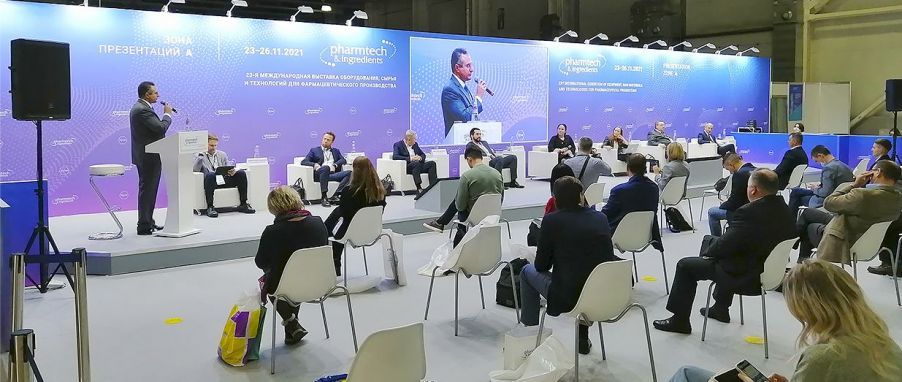LOCAL API PRODUCTION: IS THERE A FUTURE?
Experts discussed the problems and prospects of import substitution in the field of active pharmaceutical ingredients (APIs) at a round table at Pharmtech & Ingredients 2021.
As part of the business program of the first day of the exhibition "Pharmtech & Ingredients 2021", a round table "API: produce cannot be imported" was held. The session participants were invited to express their views on the future of domestic production of pharmaceutical substances and try to put a comma in the thesis in the title of the meeting. The REATORG company became a partner of the round table.

The moderator of the round table was Georgy Khachiyan, CEO of the REATORG Company, in his opening remarks that effective development of the industry requires a stable support, which, in his opinion, should be the local production of APIs.
The topic of the speech by Ratmir Dashkin, CEO of the Mendeleev Engineering Center, was the development of fine chemicals production in Russia. According to the statistics presented by the speaker, there are well-developed giants on the Russian chemical market that meet the needs for large-scale chemistry. There are significantly fewer enterprises engaged in medium and low-tonnage products, and only a few are employed in the production of fine chemicals in the country. The situation, according to the expert, can be changed by the creation of production facilities with a wide range and a unified information base on markets, products and raw material chains, as well as the emergence of chemical technology parks for joint development.
Director of FSUE “STC “Chemvest” Vladimir Savchuk spoke about the measures of industry support from the state, which include subsidizing research work for the creation of new industries. The end result of such work should be the product and the technology for its production. There is also a comprehensive program to improve competitiveness, a condition for which is the expansion of production and an increase in export volumes, financial support through installments at 1% and a number of other solutions.
Irina Vendilo, CEO of the Roskhimreaktiv Association, tried to answer the question why the production of low-tonnage chemistry is proceeding at such a slow pace. According to her, there are problems on the side of chemical and pharmaceutical companies, as well as on the market in general. Large, vertically integrated companies are not interested in products that are produced in such small quantities. This format is more suitable for small and medium-sized businesses, but it is necessary to understand that this production can only be carried out by a confidently standing company that will not lose stability due to loans and the need to wait several years for the full implementation of small-scale projects. Due to the combination of these nuances, low-tonnage chemistry is not as popular as larger areas.
Alexander Semyonov, President of Active Component JSC, recalled that the main weakness of pharmaceutical production lies in its dependence on the supply of intermediates and active ingredients from Russian and foreign colleagues. Now the industry is working with the Ministry of Industry and Trade to approve the list of intermediates that are needed by the Russian pharma. As an example of a successful escape from such dependence, the speaker cited India, which is investing hundreds of millions of dollars in the creation of technology parks for the production of the necessary components. In Russia, according to the expert, similar projects are possible if the largest companies invest their own funds in them with extensive government support.

Vitaly Smerdov, Vice President for Development of Mirpharm Group, expressed the opinion that the main task of the industry is to develop in the wake of global changes and always focus on patients. The speaker believes that the competitiveness of domestic pharma lies in innovative, “targeted” products that meet the specific needs of end consumers. This sector has the greatest demands for fine chemistry and is able to contribute to the development of this area.
Rector of the St. Petersburg University of Chemistry and Pharmacy Igor Narkevich shared up-to-date information on the training of specialists for the industry. According to the speaker, students today go to pharmaceuticals not directly for money, but for personal prospects and careers. If companies offer interesting prospects to graduates, they are happy to consider them. Over the past 10 years, the number of internship bases has increased significantly, there are conferences for communication between students and their future employers, targeted training programs and scholarships are being developed for certain areas for which there is a personnel order.
Zakhar Golant, CEO of Baltpharma, turned to the results of the Pharma 2020 strategy, having come to the conclusion that over the past ten years the pharmaceutical industry has begun to meet its objectives, but the problems discussed today are a reflection of the ways of its implementation. According to the expert, the main buyer in the industry is the state, which spends more than 500 billion a year on ordering drugs, forming the nomenclature, which the enterprises built during this time were guided by. However, the state itself does not generate demand for substances, intermediates and other products, except for final drugs, so they did not fall into the main focus of the previous program. These issues need to be worked out in the Pharma 2030 strategy, as well as to identify possible risks and their compensation in everything related to investments, development and production of substances and raw materials.
Igor Yaremenko, Development Director of Appscience, spoke about the launch and activities of his startup, which is a distributor of foreign reagents for their urgent delivery in accordance with the needs of Russian companies. According to the speaker, there are three problems in Russia that signal that Russia is not ready for import substitution in the field of APIs. These include a shortage of sources for the synthesis of substances, a lack of credibility and strong Russian brands known in the international community, as well as a lack of entrepreneurial skills in the scientific community that would help establish effective business relationships between various industry participants.
First Vice-President of the Russian Union of Chemists Maria Ivanova is confident that improving the situation in the chemical industry is an issue in which top officials of the state should participate. It cannot be solved by the actions of only one association, the speaker said. All instruments of influence on companies are in the hands of the state, with which it is necessary to establish a dialogue and involve them in the problems of the industry.
At the end of the meeting, Georgy Khachiyan called for the unity of the industry and the unification of the interests of market participants, because only the expert community can and should form a common agenda.
Based on materials from the press service of Hyve Group / "Pharmtech & Ingredients"










